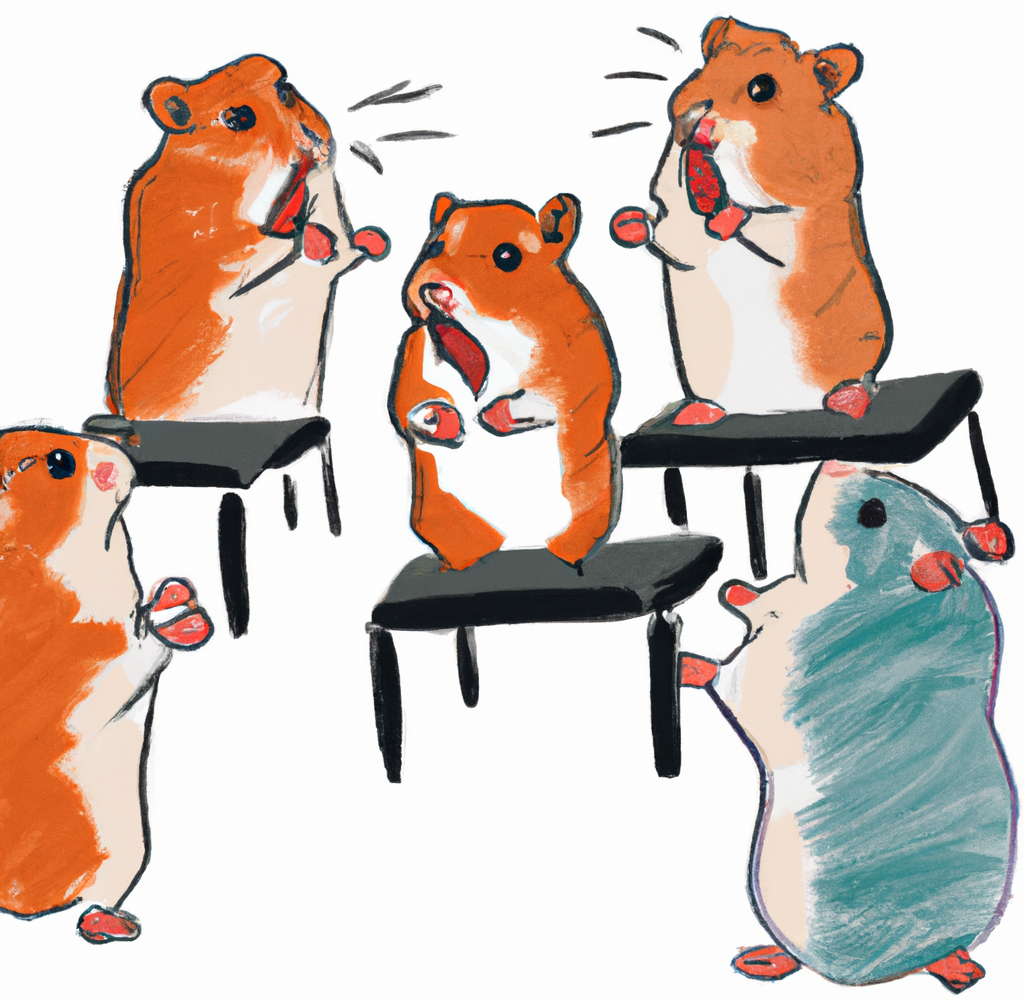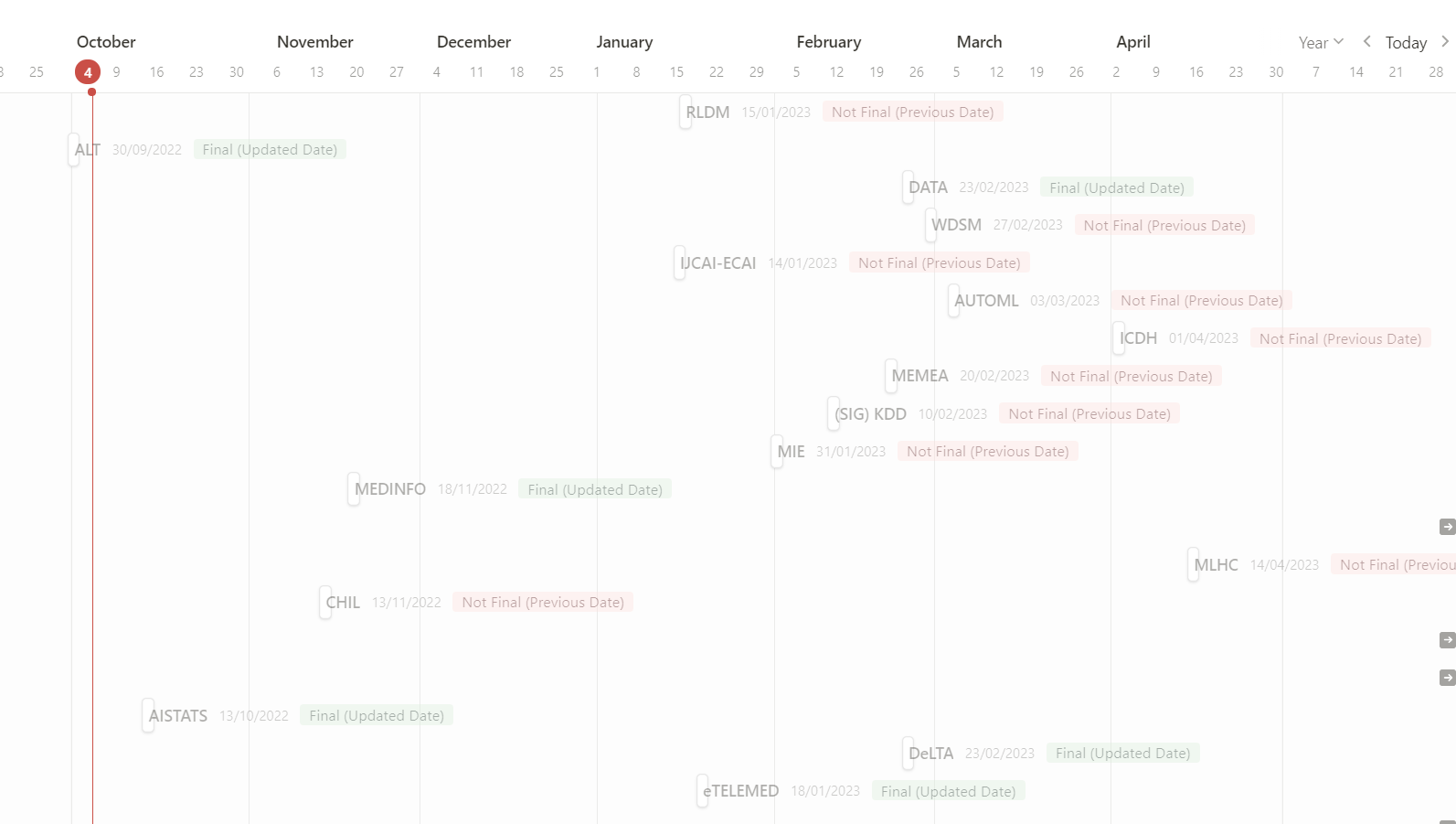Efficiently Keep Track of Your Conferences as a Researcher

The most fundamental principle of the organized mind, the one most critical to keeping us from forgetting or losing things, is to shift the burden of organizing from our brains to the external world.
– Daniel J. Levitin, “The Organized Mind”
As a researcher, it makes sense to plan your work so that you are ready to submit or even just to visit conferences. There are a few websites out there that aim to summarize conference deadlines and other data, like the wiki call for papers. While this can be a great resource to discover conferences (depending on your research field), the problem is that these websites are often only kept up by the community and may contain everything from incorrect data to predatory conferences. Additionally, you might get overloaded with conferences that you have to check for suitability. Another approach is to make use of individual mailing groups of like-minded researchers. Unfortunately, this quickly becomes hard to manage as you get more and more emails, and you have to do the upkeep.
Many people instead keep a curated list of interesting conferences. To this list, you should only add reputable and relevant conferences. For example, those that your colleagues have recommended or where a couple of your bookmarked papers are published. This is also my approach, although I prefer a slightly more intelligent list.
Notion is an app that allows you to make “dynamic” notes. It can integrate into a lot of other tools and could make your every day organization easier. It allows for a lot of customization, but can also be used in a relatively simple manner. Below, I will provide a template of a relatively simple conference tracker. So far, this has been the best way I found to track conferences. Let me know if you found a better way.
How does it work?
 Simple list of conferences in Notion
Simple list of conferences in Notion
In Notion, you can define a database with different attributes, such as text, date, or number. A date box automatically formats dates according to your preference and provides you with a pop-up calendar. This makes it easier to fill in large amounts of paper submission and conference dates. It also allows defining selection boxes for submission status, and tags, like the topics for this conference. Automatically updated attributes, such as created and last edited, allow you to see at which time this information was updated. All in all, I have the following attributes and data types for each conference entry:
- Title: Text (e.g. AAAI)
- Full Title: Text (e.g. Association for the Advancement of Artificial Intelligence)
- Topics: Multi-select (e.g. Artificial Intelligence)
- Website: Text
- Comments: Text
- Rank: Select (e.g. A*)
- Person: User (e.g. Robin van de Water)
- Created: Date
- Last Edited: Date
For each current and previous calendar year, we add the following attributes:
- Paper Deadline: Date
- Abstract Deadline: Date
- Conference Date: Date
- Final: Select (e.g. Final (updated date))
- Paper Title: Text
- Submission Status: Select (e.g. in progress)
Depending on your need, you might want to add or remove attributes.
 Paper submission deadline timeline
Paper submission deadline timeline
Additionally, Notion allows you to define “views” on this database. Consider these as different ways to view the information you stored. I created a view that allows you to view a timeline of conference deadlines. Note the attribute Final, describing if the dates are taken from last years’ conference, or they are updated for this year. This makes it easier to distinguish actual deadlines from estimations.
 Submission Kanban board
Submission Kanban board
Another potentially useful view for this database, is the submission status Kanban board. This will allow you to categorize, for yourself, which conferences you will submit to in a given year.
 Works overview
Works overview
You might consider using the template within a research group, to help define the priorities within the group. The “works overview” allows a quick overview on which work a person wants to submit to which conference. Of course, it could happen that multiple people can submit to the same conference. The template can handle this using the free text field of “paper title”, but then the submission status column can not be used.
 Grouping by conference topic
Grouping by conference topic
The group by feature of Notion can also be quite useful in several use cases. For example, you can group conferences by topic, to match your current research to a certain conference.
What is missing?
Unfortunately, this template requires repeated checking for news of calls for papers and conference dates. I would recommend putting a reminder in your favorite calendar software every two to four weeks.
The catch of my approach is that I have not found a completely automatic way to keep track of conferences. However, using the right tools can make the process a lot easier and quicker. In an ideal world, this template automatically updates information as it becomes available. Attempting this is a lot of work and might lead to incomplete information, as dates are often announced ad-hoc on small websites (and updated several times). This issue might inspire some over-engineered side project, though!
It is a good idea to keep last year’s dates, so you can approximate the deadlines for the next year. Ideally, I would like to be able to have easy control over creating new columns for a certain year; now each year has several columns associated with it, which increases the complexity and reduces viewability. At the beginning of each year, you need to do maintenance: duplicate the columns from last year and delete the ones from the year before that.
Conclusion
Everyone has their own workflow, and it might be hard to change your habits. However, I hope to provide a good starting point. I invite you to relentlessly criticize and improve this template. If you have found a better way that allows for more automatization or convenience, please reach out to me (further contact details are available on my website). You can try out this template here.
